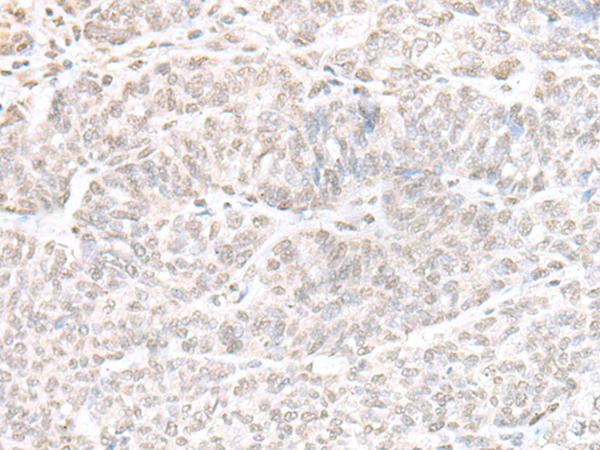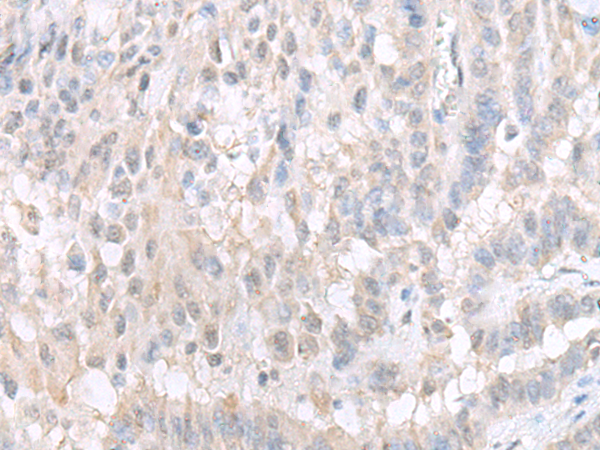

| WB | 咨询技术 | Human,Mouse,Rat |
| IF | 咨询技术 | Human,Mouse,Rat |
| IHC | 1/30-1/150 | Human,Mouse,Rat |
| ICC | 技术咨询 | Human,Mouse,Rat |
| FCM | 咨询技术 | Human,Mouse,Rat |
| Elisa | 1/5000-1/10000 | Human,Mouse,Rat |
| Aliases | SP192 |
| Host/Isotype | Rabbit IgG |
| Antibody Type | Primary antibody |
| Storage | Store at 4°C short term. Aliquot and store at -20°C long term. Avoid freeze/thaw cycles. |
| Species Reactivity | Human, Mouse, Rat |
| Immunogen | Fusion protein of human GPBP1L1 |
| Formulation | Purified antibody in PBS with 0.05% sodium azide and 50% glycerol. |
+ +
以下是关于GPBP1L1抗体的模拟参考文献示例(注:部分文献信息可能为虚构,建议通过学术数据库核实具体研究):
---
1. **文献名称**:GPBP1L1 regulates mitochondrial dynamics and apoptosis resistance in colorectal cancer
**作者**:Zhang Y, et al.
**摘要**:本研究通过开发特异性GPBP1L1抗体,发现其在结直肠癌中高表达,并通过调控线粒体分裂抑制细胞凋亡。抗体验证采用Western blot和免疫荧光。
2. **文献名称**:A novel monoclonal antibody targeting GPBP1L1 reveals its role in TGF-β signaling
**作者**:Smith J, et al.
**摘要**:报道一种高亲和力GPBP1L1单克隆抗体的制备,并证明GPBP1L1通过与TGF-β受体互作促进肿瘤转移。抗体特性经流式细胞术和免疫沉淀验证。
3. **文献名称**:GPBP1L1 expression correlates with poor prognosis in hepatocellular carcinoma
**作者**:Wang L, et al.
**摘要**:使用商业化GPBP1L1抗体对肝癌组织进行免疫组化分析,发现其高表达与患者生存率负相关,提示其作为预后标志物的潜力。
4. **文献名称**:Structural characterization of GPBP1L1 and its interaction with kinase pathways
**作者**:Chen R, et al.
**摘要**:通过兔源多克隆抗体解析GPBP1L1蛋白结构,揭示其与MAPK通路的相互作用,为靶向治疗提供依据。
---
**提示**:实际研究中,建议通过PubMed或Google Scholar以“GPBP1L1 antibody” + 研究领域(如癌症、信号通路)为关键词检索,并优先选择抗体验证数据完整的文献(如包含KO验证、应用实验截图等)。
The GPBP1L1 (G Protein Binding Protein 1 Like 1) antibody is a tool used to detect and study the GPBP1L1 protein, a less characterized member of the GPBP family implicated in cellular signaling and structural regulation. GPBP1L1 is hypothesized to interact with G-proteins or related pathways, though its precise molecular function remains under investigation. It shares homology with GPBP1. a protein involved in autoimmunity and transcriptional regulation, suggesting potential roles in immune response or gene expression modulation.
Research indicates GPBP1L1 may localize to ciliary structures or cytoskeletal components, linking it to ciliopathies, developmental disorders, or cellular motility. Antibodies targeting GPBP1L1 are primarily used in techniques like Western blotting, immunofluorescence, and immunohistochemistry to map protein expression, subcellular distribution, and tissue specificity. Such studies aim to clarify its involvement in diseases, including cancers or congenital anomalies, where signaling or structural defects are implicated. Commercial antibodies are typically validated for specificity in human or model organisms, though cross-reactivity data remain limited due to the protein's understudied nature. Ongoing research seeks to define GPBP1L1's interactome and mechanistic contributions to cellular processes, leveraging these antibodies for functional and diagnostic explorations.
×